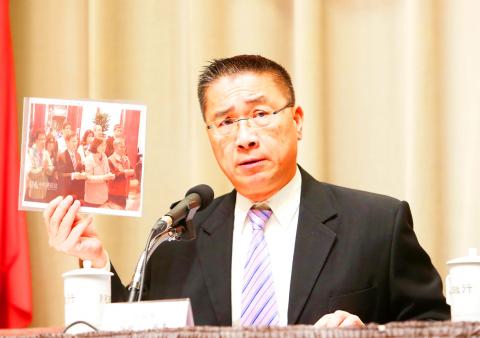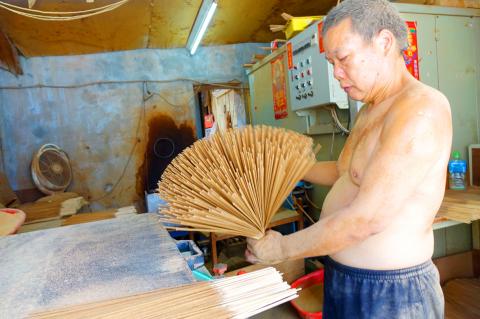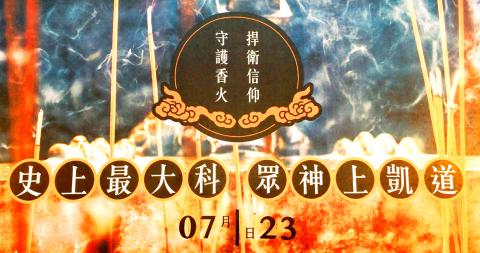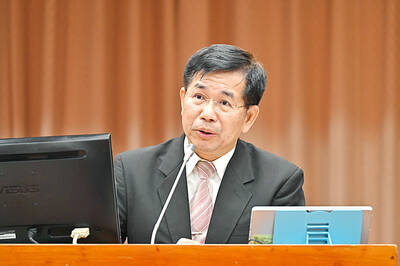The Cabinet yesterday denied accusations that an environmental measure to reduce the burning of incense and joss paper was an attempt to eliminate religious rites, saying that the measures are aimed at reducing air pollution, not interfering with religious freedom.
An Environment Protection Administration (EPA) initiative to reduce the use of incense and “ghost money” to minimize airborne pollutants has given rise to Internet rumors that the government plans to draft a religious associations act and phase out the practice of burning incense.
Dozens of local temples and religious organizations are to protest in front of the Presidential Office Building in Taipei on Sunday to demand the protection of religious traditions.

Photo: CNA
The Cabinet said that the EPA never intended to eliminate incense or joss paper, but only to encourage their reduced use for environmental reasons.
“It is a misunderstanding. The EPA has never banned incense or ghost money. Never. We only want to reduce the use of firecrackers, ghost money and incense due to environmental reasons,” Executive Yuan spokesman Hsu Kuo-yung (徐國勇) said.
Showing photographs of President Tsai Ing-wen (蔡英文) and Premier Lin Chuan (林全) holding incense sticks during the Lunar New Year holiday, Hsu said the government respects and would never attempt to stop religious practice.

Photo: Liu Hsiao-hsin, Taipei Times
The Constitution protects religious freedom and any law limiting this freedom is prohibited, because it would be unconstitutional, Hsu said.
“To live up to their social responsibility, many temples have voluntarily reduced the use of incense, ghost money and firecrackers” without any government orders, Hsu said.
The EPA said the burning of incense and firecrackers produces fine particulate matter containing heavy metals and carcinogenic chemicals, and people exposed to such pollutants often complain of coughing and tearing eyes.

Photo: CNA
Air quality tests show that the concentration of air pollutants at one temple decreased by two-thirds after it voluntarily reduced the number of incense burners, suggesting that air pollution could be mitigated with reduced use of incense, the EPA said.
At a Democratic Progressive Party (DPP) meeting on Wednesday, Tsai said the Cabinet was slow to respond to the rumors.
DPP sources quoted Tsai as saying that the Executive Yuan was passive in explaining the environmental policy, while Minister of the Interior Yeh Jiunn-rong (葉俊榮) failed to promptly quell the rumor that a ban was to be imposed on religious practices.
The president asked the Cabinet to communicate with temples and religious organizations to reduce incense burning without causing misunderstanding.
The quality control of imported incense and ghost paper has to be improved to reduce airborne pollutants, Tsai said.

The International Industrial Talents Education Special (INTENSE) Program to attract foreigners to study and work in Taiwan will provide scholarships and a living allowance of up to NT$440,000 per person for two years beginning in August, Minister of Education Pan Wen-chung (潘文忠) told a meeting of the legislature’s Education and Culture Committee yesterday. Pan was giving an update on the program’s implementation, a review of universities’ efforts to recruit international students and promotion of the Taiwan Huayu Bilingual Exchanges of Selected Talent (BEST) program. Each INTENSE Program student would be awarded a scholarship of up to NT$100,000 per year for up to

BASIC OPERATIONS: About half a dozen navy ships from both countries took part in the days-long exercise based on the Code for Unplanned Encounters at Sea An unpublicized joint military exercise between Taiwan and the US in the Pacific Ocean last month was carried out in accordance with an international code, the Ministry of National Defense (MND) said yesterday. According to a Reuters report citing four unnamed sources, the two nations’ navies last month conducted joint drills in the Western Pacific. The drills were not made public at the time, but “about half-a-dozen navy ships from both sides, including frigates and supply and support vessels, participated in the days-long exercises,” Reuters reported, citing the sources. The drills were designed to practice “basic” operations such as communications, refueling and resupplies,

‘MONEY PIT’: The KMT’s more than NT$2 trillion infrastructure project proposals for eastern Taiwan lack professional input and financial transparency, the DPP said The Democratic Progressive Party (DPP) caucus yesterday said it would ask the Executive Yuan to raise a motion to oppose the Chinese Nationalist Party (KMT) caucus’ infrastructure proposals and prepare to file for a constitutional interpretation if the KMT-dominated legislature forces their passage. The DPP caucus described the three infrastructure plans for transportation links to eastern Taiwan proposed by the KMT as “three money pit projects” that would cost more than NT$2 trillion (US$61.72 billion). It would ask the Executive Yuan to oppose public projects that would drain state financial resources, DPP caucus secretary-general Rosalia Wu (吳思瑤) said. It would also file for

SELF-SUFFICIENCY: The project would only be the beginning, as Taiwan needs at least 120 satellites to ensure uninterrupted communication, Wu Tsung-tsong said The Taiwan Space Agency (TASA) yesterday said it plans to launch six low Earth orbit satellites starting in 2026 as part of the government’s plan to boost the resilience of the nation’s communications. The development of the technology gained attention after Ukrainians were able to access the Internet through Space Exploration Technologies Corp (SpaceX) CEO Elon Musk’s Starlink satellite service, despite their infrastructure being severely damaged in the war with Russia. Two of the satellites would be built by the government, while four would involve cooperation between TASA and private contractors. “Over the past 30 years, the satellite technology in Taiwan has